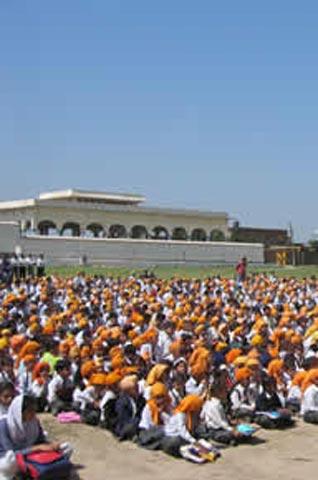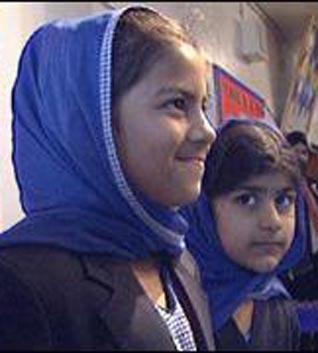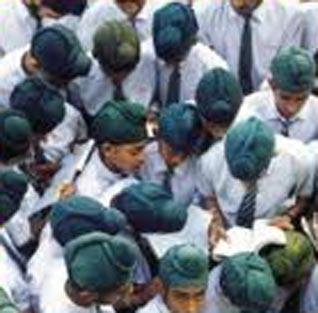Roundtable
Parochial Schools
The Roundtable Open Forum # 43, August 31 - September 6
EDITOR
The Rules of the forum are posted here on the right, and need to be followed strictly by all participants.
The following is this week's (August 31 - September 6) topic for discussion, which should focus on the questions posed therein:
PAROCHIAL SCHOOLS
One of the most critical issues faced by minorities everywhere is around the education of their children.
A number of communities have resorted to parochial schools - that is, schools which impart their religious teachings, in addition to the regular curriculum.
Thus, Catholic and Jewish schools have fared well in meeting the needs of their respective communities around the world.
Sikhs too have had considerable success. As one example of many from India: The Guru Harkrishan Public Schools are popular and have boasted the highest standards. In the diaspora Sikh schools in Thailand are considered the best in the land and cater to students from all backgrounds, as do Sikh schools everywhere.
On the other hand, Muslim schools have come under extraordinary scrutiny in the post-9/11 years as possible breeding grounds for extreme views.
Oddly, Sikh communities in the West have not got around seriously to establish their own schools. True, Sunday Punjabi and gurmat schools abound and have done yeoman service. So have some parochial schools in certain communities such as in Ontario and British Columbia in Canada, but they have yet to make their mark.
POINTS TO PONDER
Do you think Sikh schools are the answer to the challenges our communities face in the diaspora?
Do you think such schools are good for our children? Or bad?
Why?
If any of you have had personal experience with some of these schools - the good ones and not-so-good ones - please share your thoughts with us.
What direction should the Sikh community take on this issue? In the larger centres such as Birmingham, New York, California, Toronto, Vancouver ...? Or in the smaller, scattered, isolated communities which are to be found in every nook and corner of the globe?
August 31, 2010
Conversation about this article
1: R. Singh (Canada), August 31, 2010, 11:29 AM.
On the surface, Sikh schools look like a very attractive option, where kids are taught in an idyllic atmosphere of head coverings and drilled religious values, out of reach of the real world. We would like to use these schools as an substitute for our own involvement with the finer points of their lives, like imparting religion. But the very fact that a 'Sikh' school also implies imposing certain dress and thought restrictions translating into the fact that we are retreating into our comfort zone, disconnecting from the wider world. If school is just about getting grades, then it is an option, where kids can be taught the curriculum and into being defined by dress, not by innovative thought, which was the hallmark of the Sikh for so long. Unless we come up with schools run by Sikhs, who can accommodate secular education, not focused on making martial artists in saffron turbans, we will have lost the very appeal of Sikhi and its universality.
2: Harinder Singh (San Antonio, Texas, U.S.A.), August 31, 2010, 12:22 PM.
We must have K-12 Sikh schools at least wherever the Sikh population is concentrated so that they are cost effective and feasible. Parents must have the option for schooling with a Sikh bent, but not where the dangers of soft talibanization exists. Currently, there is too much talk about a Sikh University in the west without having the conduit of K-12 students. I envision a day when 1,000 Sikh schools can generate enough traffic and potential to fill a Sikh seminary, few colleges and a university. It all starts with a few regional, affordable Sikh schools where excellence is exhibited, not just boasted.
3: Harpreet Singh (Cambridge, MA, U.S.A.), August 31, 2010, 12:35 PM.
This is a wonderful topic with which the Sikh community must engage to advance an agenda. In the past, I have argued for Sikh schools. There is a significant opportunity cost of not engaging in thought leadership that will lead to establishment of credible Sikh schools on the North American soil. In my view, most of the Sikh schools that exist in the Punjab and Canada are failures because they have not created a curriculum that is relevant to the current needs of the panth. Only after a serious discussion on the design of such a curriculum can we begin to consider physical buildings. The software must come before the hardware.
4: Inderpreet Singh (Chelmsford, MA, U.S.A.), August 31, 2010, 12:46 PM.
Couple of points I would like to share, based on personal experience: 1) I attended Guru Harkrishan Public School, Vasant Vihar, New Delhi, India, for 2.5 years. I can safely say that my Gurmukhi writing/ reading and gurbani reading skills were nurtured there during that young age, so that it is now almost second nature with me. The connection of the youth to their Sikhi roots is only through language which for us is actually through the script, i.e., Gurmukhi. The Sunday Khalsa Schools are trying their best, but as stated above, not meeting the mark. The focus is on colloquial Punjabi, and not the language of the Guru Granth. So the connection is with purely contemporary culture, not gurbani. 2) The Khalsa English School, of Medan, Indonesia was established in the 1930's. My understanding is that the the students of the school (and they were not exclusively Sikh) had to visit the gurdwara, church, mosque, mandir, etc., every morning before beginning school. If someone is familiar with the history of the Khalsa English School, please add here. The point is, a Sikh school does not have to be exclusively Sikh. An environment where the school caters to students of all faiths, with a focus of excellent overall education as well as catering exceptionally to the Sikh students' religious studies is what we need to envision. No school out there has that as far as I know.
5: Chintan Singh (San Jose, California, U.S.A.), August 31, 2010, 2:06 PM.
I being a product of Guru Harkrishan Public School can say that those 12 years of education helped me become a confident Sikh and fluently speak, write and read Punjabi which has helped me immensely in connecting with my Guru and gurbani. I believe Sikh schools would be very helpful for children of the diaspora, specially at a younger age, in instilling love for Sikhi and confidence in wearing and carrying the Sikh articles of faith before they become young men and women and face their friends from other religions. That grounding in Sikhi I to date believe was the best thing in my life. However, at GHPS, we were not taught just the Punjabi Language and Sikh History. We had a strong curriculum in comparative religion and philosophy which progressed with the child's age and at least while I was there, the school, specially the Vasant Vihar branch (which is where I went), excelled in academics and sports as well. Now having a child of my own, how I wish there was something similar to GHPS here in the west. If not a full school, then perhaps a daycare, a pre-school. Since I have a four year old son, I am always looking for ways to give him the tools of Sikhi that I was fortunate to have. I know building a school is an expensive proposition for a young and scattered community like ours. A prominent gentleman in our San Francisco Bay Area Sikh community had once suggested a much more modest and grassroots idea than building a school, i.e., grant scholarships to young Sikh men and women to study teaching and make careers as teachers (not teachers of Sikhism but any general subjects such as Maths and English). These professional teachers would work in government funded public schools and help provide support to the Sikh children in those schools. The idea being - let us first create enough qualified teachers who belong to the Sikh faith. These teachers will provide the needed dissemination of Sikhi in general mainstream schools and act as mentors and supporters for the isolated Sikh children. This is a small and interim effort while our community can mature to afford and unite having brick and mortar schools in major metropolises of U.S., U.K. and Canada. If and when we do have one or more physical Sikh schools, I believe they should only be for pre-school and go to middle school since we do want our children to confidently mingle and associate with their non-Sikh counterparts. We only need them to be secure and well grounded in Sikhi till their pre-teens. For high schoolers, the same facilities could be used for after school and summer programs.
6: Aryeh Leib (Israel), September 02, 2010, 8:59 AM.
Harpreet Singh ji: I agree that it's a "wonderful topic with which the Sikh community must engage", and I would have thought there would be much more discussion on it. The fact that it didn't generate more than a few comments is no small part of what the problem is today. I'll extrapolate from my knowledge of small, outlying Jewish communities in North America. Education was and is the "make or break" issue that determined the survival of the community. And this from a religion where universal scholarship has always been the top priority. To all those who put their hard-earned money into building palatial gurdwaras, what are you doing to make sure there will be a next generation for whom a gurdwara will even register on their radar screens? Isn't the honor accrued by supporting the continuity of Sikhi itself the greatest tribute one could hope for in this life?
7: Amardeep (U.S.A.), September 02, 2010, 12:43 PM.
I do not know if the model of education at Baru Sahib, India, is considered a success by the majority. Their model can be incorporated in the West.
8: Sunny (London, England), September 03, 2010, 3:43 AM.
1) With youth numbers dwindling in the gurdwaras and many that attend using it more for social chit chat, a change of direction and the usage of different methods to impart Sikhi is a good thing. 2) Faith schools 'generally' have motivated parents, teachers, etc., which works to the benefit of students. 3) Faith schools can also polarize and create a 'them-and-us mentality'; unless you live in Punjab (majority Sikh), the population of such schools is not reflective of society at large. It can be beneficial to learn, interact, communicate and observe other non-Sikh groups in society. In the U.K., we have quite a few Sikh Schools, a certain Guru Nanak College (age group 11-16) is well regarded for its academic achievements, there are others too, and new ones being built for younger age groups. Bottom line, if it's a choice between building and decorating swanky new gurdwara or building a first class Sikh education facility to churn out the next generation of Sikhs, I'm with the latter.
9: Baljit Singh Pelia (Los Angeles, California, U.S.A.), September 03, 2010, 6:32 PM.
I recently visited Punjab where nowadays most Sikh families take pride in sending their children to convent schools where the dress code is buttoned shirts with a tie, and skirts for girls. The day starts with a Christian prayer. This is happening where Sikhs are not much of a minority. Sikh schools somehow don't flourish. My grandfather started a English medium K-12 Sikh high school in our village in the eighties. He built the numbers up to 850 and the day started with Ardaas. Once he handed it over to the S.G.P.C., the student count over the years has dropped to 150 and it is on the verge of shutting down. In the U.S., the Sikh population is spread out, so I think it may be possible to have strategically placed boarding schools that draw on the local school districts for the K-12 education and then supplement that with a curriculum of Sikhism at the boarding campus. The other alternative could be busing kids after school to the local gurdwara that has an after-school program that includes homework assisting along with Sikhism education.
10: Gurdip Chana (London, United Kingdom), September 04, 2010, 6:13 PM.
We have a faith school near my house known as Guru Gobind Singh Khalsa College. It has good grades and a mix of students from different backgrounds. However, the place is in urgent need of modernization. There should be state of the art libraries, modern class room facilities, full gurmat and kirtan classes, sports (certainlly there is a lack of this over there!) etc. Anyway, what we need is more faith schools. They work well to instill values. But it is imperative that be run properly; i.e., not only funded well but teaching the true Sikh princples and creating 21st century Sikh scholars. We Sikhs will ONLY grow with more Sikh scholars; as a growth in deep understanding of Sikhi shall we be able to help share this knowledge to other people of this world. Everybody today is looking for answers; hence why Islam is growing so rapidly. I've seen so many converts in the UK from all backgrounds. They do not have half the idea about Sikh principles. OUR OWN FAILURE! It's about time some changes happened. We can start by making Sikh Schools.






